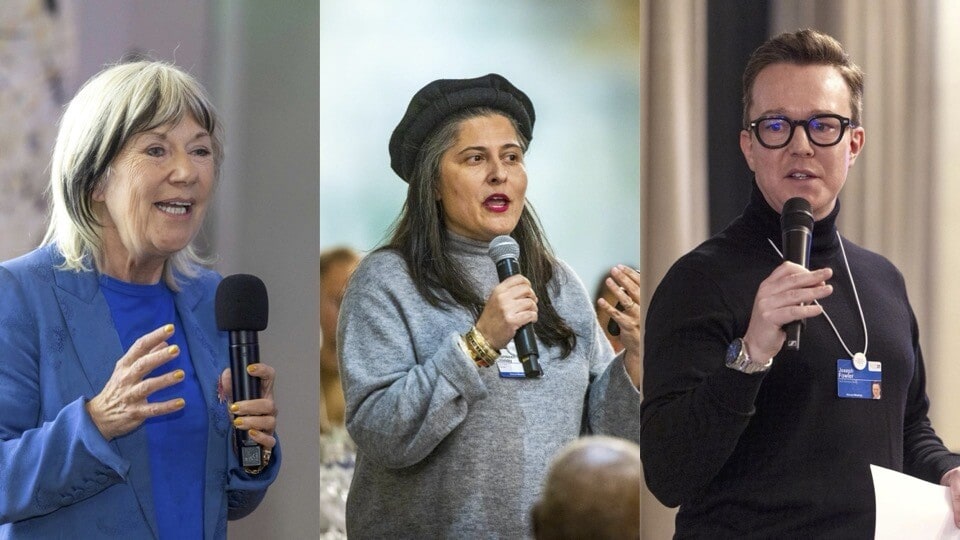It's time to tackle tech's growing influence on the creative economy

'Platforms exert enormous influence on our diets of information and entertainment' Image: REUTERS/Kiyoshi Ota
Recently, there’s been a lot of talk about technology platforms. When people refer to technology platforms, they tend to mean those which use the internet to match-make suppliers and customers. In many cases this is intuitive: Alibaba connects buyers of goods with sellers; Airbnb matches property owners with those wishing to rent; Uber pairs drivers with people who want a ride.
These examples all concern physical assets, but the same can be true for content. Google search, for instance, indexes individual web pages so that people can access them in one place, while Facebook allows people to post photos, videos and other forms of content, and to discover others’ posts via a personalized feed. What defines a technology platform is how it puts supply, distribution and end-user all in the same place.
All the platforms rely on artificial intelligence (AI) as the technology to connect supply with demand. Nowhere is this more true than in the creative economy, the part of society where jobs rely on knowledge-based and non-repetitive skills and encompass creative endeavours, from music, film and television, to gaming, advertising, arts and fashion.
The use of AI in the creative economy has led to plenty of exciting advances the production, distribution and consumption of content. Some examples are outlined in a new white paper from a joint research project between the World Economic Forum and McKinsey and Company. Developments include the use of AI to more effectively match content with audiences, as algorithms learn and classify a user’s preferences in order to recommend content. Elsewhere, AI is used to perform tasks too difficult for humans and in the creation of original content, such as instrumental sounds that humans have never heard before or scripts for movies and novels.
While AI has great potential for the creative economy, many of the creative outputs it enables are frequently routed through technology platforms, a process which redefines the relationship between creators, publishers and technology companies. As platforms and creative economies converge they create a new environment in which the platforms exert enormous influence on our diets of information and entertainment. This raises difficult governance questions that must be addressed by multiple stakeholders.
These are some of the study’s most important findings:
- Platforms have a significant influence on the editorial nature of creative content: This affects the types of content that flourish as companies provide incentives, including money and advice, to sway publishers towards creating content that works well on their platforms. Algorithms ensure that certain formats determined by the platforms are prioritized in consumer searches and feeds.
- Technology platforms reap the financial benefits of creative content: Technology platforms are the main referral sources for online publishers. Five companies take almost 80% of global mobile advertising revenue and, by some estimates, almost 90% of the growth is going to just two companies, Google and Facebook.
- Publishers hold less responsibility for damaging content, but it is unclear who is now accountable: Platforms have supported initiatives that address media literacy and provide resources for quality news companies to develop better content. They have attempted to prioritize content from family and friends in place of businesses, brands and media. However, damaging content has persevered, undermining trust.


The positive advances that AI brings are transforming value chains across the creative economy, but there are also negative effects. Technology platforms have been fundamental in shaping the online creative environment and today they face questions when their tools are used maliciously, to exacerbate the “fake news” problem, for example. While this problem did not start because of AI, the use of the technology has enabled the creation and distribution of misinformation and increased its reach. As platforms grapple with this issue they find themselves tied to questions about how to govern AI even as they push the boundaries of what can be achieved.
If the creative economy is to benefit society, the platform economy will need to be rebalanced to align with what is best for society. As the ability of technology to inform and shape public opinion grows, so do the potential risks of opacity in how the platforms make decisions. There is an ongoing debate about what needs to be done to address today’s information challenges; how the platforms respond to this conversation will have a considerable impact on the outcome.
Read the full whitepaper, Creative Disruption: The impact of emerging technologies on the creative economy, here.
Don't miss any update on this topic
Create a free account and access your personalized content collection with our latest publications and analyses.
License and Republishing
World Economic Forum articles may be republished in accordance with the Creative Commons Attribution-NonCommercial-NoDerivatives 4.0 International Public License, and in accordance with our Terms of Use.
The views expressed in this article are those of the author alone and not the World Economic Forum.
Stay up to date:
Technological Transformation
Related topics:
Forum Stories newsletter
Bringing you weekly curated insights and analysis on the global issues that matter.
More on Arts and CultureSee all
Elena Raevskikh and Giovanna Di Mauro
October 22, 2025






